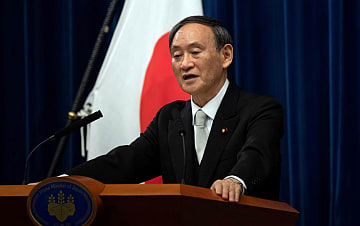
2020年9月16日、東京都内で行われた首相就任確認後の記者会見で話す菅義偉氏
Carl Court/Pool via REUTERS/File Photos
Carl Court/Pool via REUTERS/File Photos
菅総理による日本学術会議の会員任命拒否をめぐって、先週から国会で論戦が始まった。海外での報道を紹介するのにはよいタイミングである。国内だけでなく海外からも反応が出始め、科学専門誌のサイエンス誌およびネイチャー誌が記事を掲載した。今回のブログ記事ではロイター通信に掲載された英文記事の和訳を紹介する。
元記事:
https://www.reuters.com/article/uk-japan-politics-academics/japans-suga-under-fire-defends-rejection-of-scholars-for-science-panel-idUKKBN26Q1HO
フロイター通信:日本の菅政権、学術会議の任命拒否の弁明に非難
2020年10月5日 7:40 By Linda Sieg, Yoshifumi Takemoto
東京(ロイター通信) - 日本の菅義偉首相は月曜日、憲法の学問の自由の原則に反するとの批判が高まる中、日本学術会議の会員として6人の学者を拒否したことで炎上していたが、自身の決定を擁護しました。
安倍晋三が辞任した後、先月就任した菅氏は、経済を再生させ、COVID-19を抑制しようとする中で、規制緩和、携帯電話料金の引き下げ、サービスのデジタル化などを公約に掲げ、有権者の間で高い支持を得ています。
しかし、過去の安倍政権批判で知られる6人の候補者を拒否したことで、有権者との蜜月を脅かすような騒動が起きる可能性があります。
問題となっているのは、第二次世界大戦後、政策に独立した科学的意見を提供するために設立された、影響力のある210名の日本学術会議です。
3年ごとに半数の会員を選ぶパネルの会員に推薦された105人の学者のうち、6人が選ばれました。
彼らが批判した政策には、安倍首相が平和主義憲法を再解釈して海外で軍隊を戦わせるという歴史的な防衛政策の転換や、2013年にメディアの自由への懸念に火をつけた秘密保護法などが含まれています。
野党は決定を攻撃し、菅氏に公的な説明を要求し、批評家たちはソーシャルメディアを利用し、Change.orgの請願書は月曜日の夜までに10万人以上の署名を集めました。
菅氏は国内メディアのグループ・インタビューで、日本学術会議が年間10億円(947万ドル)の公的資金を受け取っていることを付け加え、決定は正当なものだと繰り返しました。
菅氏は個々のケースについてはコメントを差し控えましたが、今回の決定は「学問の自由とは全く関係ない」ものであり、政府がバックアップした法案に対する学者の立場とは何の関係もないと述べました。
1983年以来、首相は日本学術会議の勧告に基づいて会員を任命しており、それを拒否する前例はないと複数の政治アナリストは述べています。
上智大学の中野晃一教授は、「日本国憲法には学問の自由のための条文があるが、それは、戦時中の軍国主義者による学問と科学の統制の直接的な結果である」と述べています。
軍事利用の可能性のある学術研究に懐疑的な姿勢を取ったことで、2017年に安倍政権ともつれた日本学術会議は、菅氏に説明と6人の任命を求めています。
「なぜ私が任命されなかったのか、まったくわからない 」と、6人のうちの1人、岡田正則・早稲田大学大学院法務研究科教授はロイター通信に「私が(過去に)書いたことは、政府は法律に基づいて行動すべきだということだった...。それは当然のことだ」と語りました。
保守派の中には、安倍晋三首相の中国に優しい姿勢を非難する人もいます。岡田氏は北京とのあらゆる特別な関係を否定しました。
任命拒否されたもう一人の学者、宇野重規・東京大学社会科学研究所教授は直接のコメントを拒否しましたが、言論の自由の重要性を強調しました。
「民主主義社会の最大の強みは、批判対してオープンかつ継続して修正を加えていく能力にある。」と彼は声明で述べています。
関連記事:
サイエンス誌:日本の新首相、日本学術会議(SCJ)との戦いを選択
https://blog.goo.ne.jp/ktonegaw/e/8892ba9db7f928d7e0124073350caeab
ネイチャー誌:これまで以上にネイチャー誌が政治をカバーしなければならない理由
https://blog.goo.ne.jp/ktonegaw/e/4be5323228aade9b232fea3b4b796a94
ル・モンド紙:日本の首相が知的世界と戦争
https://blog.goo.ne.jp/ktonegaw/e/91aa2c98e57c07d12ba0acda7aac1f38
フィナンシャルタイムズ紙:日本学術会議スキャンダルが菅政権の蜜月時代を脅かす
https://blog.goo.ne.jp/ktonegaw/e/39d3cee6f630b01f8c9df532b5565626
注意: 多忙のため、いただくコメントの公開承認が遅れることがあります。また、いただくコメントの内容によっては公開承認しないことがありますので、ご了承ください。
メルマガを書いています。(目次一覧)

応援クリックをお願いします。




英語記事全文:
FILE PHOTO: Yoshihide Suga speaks during a news conference following his confirmation as Prime Minister of Japan in Tokyo, Japan September 16, 2020. Carl Court/Pool via REUTERS/File Photo
Japan's Suga, under fire, defends rejection of scholars for science panel
By Linda Sieg, Yoshifumi Takemoto
OCTOBER 5, 2020 7:40
TOKYO (Reuters) - Japanese Prime Minister Yoshihide Suga, under fire for rejecting six scholars for membership of a science advisory panel, defended the move on Monday amid growing criticism that it violated the constitution’s principle of academic freedom.
Suga, who took office last month after Shinzo Abe resigned, has enjoyed high support among voters who approve of his promises to deregulate, reduce mobile phone rates and digitalise services as he tries to revive the economy and rein in COVID-19.
But his rejection of the six candidates - some of them known for past criticism of Abe’s policies - could stoke a furore that threatens his honeymoon with voters.
At issue is the influential 210-strong Science Council of Japan (SCJ), set up after World War Two to provide independent scientific input for policy.
The six were among 105 scholars recommended for membership of the panel, which chooses half its members every three years.
Policies they criticised include Abe’s reinterpretation of Japan’s pacifist constitution to let troops fight overseas in a historic shift for defence policy, and a 2013 state secrets act that sparked concern over media freedom.
Opposition parties have attacked the decision and demanded a public explanation from Suga, critics have taken to social media and a Change.org petition urging the appointments drew more than 100,000 signatures by Monday evening.
In a group interview with domestic media, Suga repeated that the decision was legitimate, adding that the Council received annual public funds of 1 billion yen ($9.47 million).
He declined to comment on individual cases but said the decision was “totally unrelated to academic freedom,” and had nothing to do with scholars’ positions on government-backed legislation.
Since 1983, the prime minister has appointed members based on SCJ recommendations, and there is no precedent for rejecting them, political analysts said.
“The constitution of Japan has a specific article just for academic freedom, which is ... a direct result of wartime control of academia and science by the militarists,” said Sophia University professor Koichi Nakano.
The council, which tangled with Abe’s government in 2017 after taking a sceptical stance to academic research with potential military uses, has demanded that Suga explain his decision and appoint the six.
“I don’t know at all why I was not appointed,” one of the six, Masanori Okada, a professor at Waseda Law School, told Reuters. “What I wrote (in the past) was that the government should act in accordance with the law... That is only natural.”
Some conservatives have blasted the SCJ for what they call its China-friendly stance. Okada denied any special relationship with Beijing.
Another of the spurned scholars, Shigeki Uno, a political science professor of the University of Tokyo, declined direct comment on the rejection, but stressed the importance of free speech.
“The greatest strength of a democratic society is its ability to be open to criticism and constantly modify itself,” he said in a statement.






















